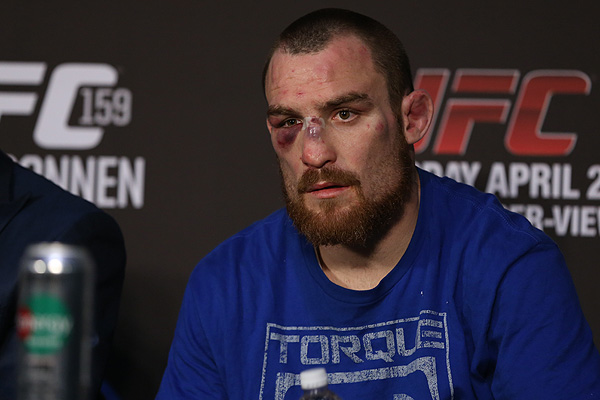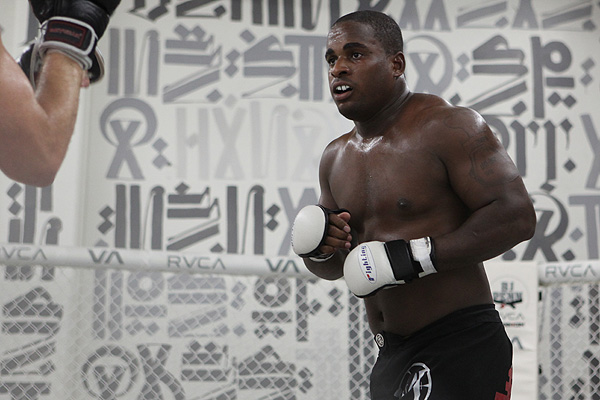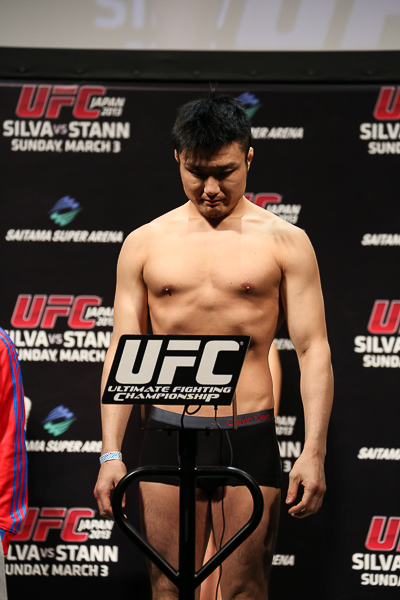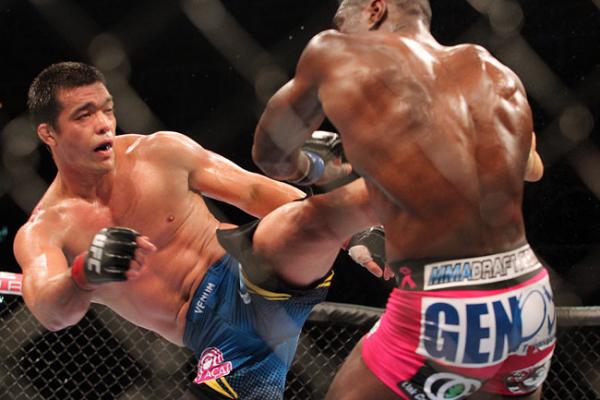Sherdog.com’s 2013 Miscellaneous Awards
Robbery of the Year

Pat
Healy’s signature victory went up in smoke. | Photo: D.
Mandel/Sherdog.com
Robbery of the Year
By Todd Martin and Jordan Breen
Whoever said pot never seriously hurt anybody has not met Pat Healy, the man at the center of Sherdog.com’s “Robbery of the Year” for 2013.
Advertisement
Owning few of the credentials most likely to get Healy a big opportunity on a major stage, he had to just keep grinding. He made a brief one-fight stop in the Octagon in 2006, losing to Anthony Torres at UFC Fight Night 6, and did not get a chance to return to the sport’s biggest platform until he faced elite lightweight Jim Miller at UFC 159 in April.
The fight ended up being the crowning achievement in the career of
“Bam Bam.” Entering the fight as a better than 2-to-1 underdog and
fighting on Miller’s home turf in New Jersey, Healy took the fight
to the AMA Fight Club standout. Healy used his size and grappling
ability to get the better of another accomplished grinder and was
on the verge of a solid decision win as time winded down. Not
content to just win a clear decision, Healy turned it on at the end
of the third round and used a rear-naked choke to become only the
second man to ever submit Miller in MMA competition.
After the fight, Healy was rewarded for his work with $130,000 in announced bonuses for “Fight of the Night” and “Submission of the Night.” It was more money just in bonuses than Healy had earned for his past three fights combined. Following years of hard work, he finally had arrived professionally and financially.
Then the drug test results came back. Healy tested positive for marijuana, and all those positives went up in, well, smoke. New Jersey overturns fight results based on test failures for marijuana, an athletic commission policy that has widely been criticized by fight fans since Nick Diaz was stripped of his classic gogoplata win over Takanori Gomi at Pride Fighting Championships 33 in Nevada. Thus, Healy’s win over Miller was changed to a no-contest. Likely even worse for Healy, the UFC does not pay out post-fight bonuses to fighters who fail drug tests for marijuana, so he lost out on the biggest payday of his career, too.
Healy, for his part, took the news well. He apologized for making a bad decision and did not complain about the punishment. He was contrite and focused on his own responsibility. That allowed him to move on from the UFC 159 disaster and seek to redeem his 2013.
Unfortunately, things did not work out that way for Healy. He lost his next two fights to emerging contenders Khabib Nurmagomedov and Bobby Green. As had been the case so often in his career, Healy was good but had to deal with stiff and motivated opposition. That moved him out of the lightweight contender mix and into the position of badly needing a win to continue his UFC career. The victory over Miller and six-figure bonus now seem even larger losses than before.
Some folks are not sympathetic in the slightest to Healy’s plight. He knew the rules, they say. He made a dumb decision and broke those rules, they note. Marijuana usage is still illegal in most states and he broke the law, they observe. These objections are not wrong. Healy’s decision to use weed when he knew he would be tested for it was profoundly stupid. Of all the great sacrifices that are needed to be a successful professional MMA fighter, giving up marijuana does not rank very high. However, those observations, which focus on how to morally evaluate Healy, miss the bigger point, which is the wisdom and fairness of the policies that he foolishly violated.
When state athletic commissions gained the ability to overturn fight results because of the use of performance-enhancing drugs, it was a welcome and just change. If a fighter gains a chemical advantage in a bout, that result is illegitimate. Still, the argument that marijuana gives a fighter a substantive advantage in a fight has always been extremely flimsy.
Before drug test reversals, you had to remind yourself when scanning through a fighter’s record that a win came with the help of an unfair advantage. With marijuana-related no-contests, you now have to remind yourself that a no-contest was really a win effectively removed on a moral turpitude clause. He may have been wrong to smoke pot, but Healy still beat Miller fair and square, and the record books do not acknowledge his biggest career win.
The UFC has a better argument when it comes to its discretionary post-fight bonuses. “Fight of the Night” bonuses are not tied to simply winning and losing, and the UFC may feel it does not want to reward fighters who bring negative publicity to the company. However, that raises the basic question of proportionality. Yes, it is not great PR for a fighter to fail a drug test. It may even merit punishment, but does it warrant penalizing the biggest payday of a fighter’s long career?
Healy will grind on. He has never taken the easy path and has not asked for any favors. He is better equipped to deal with such a devastating turn of events than most. Ironically, in a year when polls found Americans for the first time ever favored marijuana legalization, both boxing (Julio Cesar Chavez Jr.) and MMA (Healy) doled out their stiffest punishments in history for marijuana use.
We will stipulate Healy was wrong to get high prior to his fight if you will stipulate stripping him of both the biggest win of his career and the likely single biggest paycheck of his life was a rather draconian response to his bout of reefer madness.
2. Lorenz Larkin vs. Francis Carmont

Photo: D.
Mandel/Sherdog.com
The judges did Larkin no favors.
deals in his Octagon debut.
Carmont, who was fresh off of his previous undeserved decision win over Tom Lawlor at UFC 154, pressed forward for the duration of the contest, seeking takedowns on the flashy striking Larkin. However, in spite of his four-or-more-inch height advantage, considerable reach advantage and ostensible wrestling advantage, Carmont struggled to produce any meaningful offense over the 15 minutes, as he was picked apart by counters from the Riverside, Calif., native.
Larking showed off incredible balance and great defensive instincts, defending a single-leg attempt from Carmont in the first round with his ankle wresting on the Frenchman’s shoulder, hopping around on one foot while still punching his foe. It was a microcosm of the fight itself: Carmont doggedly tried for takedowns but mostly failed, while Larkin craftily snuck away and countered with punches, elbows and low kicks. Even when Carmont did get a takedown in the third round, he was hit with a kimura, and Larkin used it to scramble back to his feet.
“Limitless” was hardly that in his bout with Larkin. The Firas Zahabi pupil was 2-for-11 on his takedowns in the fight and accrued no real offense whatsoever. In the first round, Carmont landed a single strike to Larkin’s 11. In the second, he landed eight to Larkin’s 21. All this while he ran forward into counters while failing at takedowns.
Even if someone liked Carmont in the third round, finding a second frame for him seemed dubious. Yet somehow, all three judges -- Michael Bell, Derek Cleary and Edward Collantes -- had it 29-28 for Carmont. Bell and Cleary even saw fit to give Carmont the first round for his one-strike, zero-takedown performance. All too often the word “robbery” is tossed around in MMA, referring to any fight that comes down to a contentious swing round. Here, Larkin won no less than two and most likely won three rounds, while judges literally rewarded his opponent for doing next to nothing. Silicon Valley might be a peachy place to live, but Larkin proved you can still get robbed in San Jose.
3. Takanori Gomi vs. Diego Sanchez

Photo:
Taro Irei/Sherdog.com
Gomi was on the wrong side of the scorecards.
That is not to say that this was not a competitive fight. In all three rounds, both men had considerable offense. However, Gomi soundly out-landed Sanchez in terms of total and significant strikes by FightMetric tally in all three rounds and did so while landing the better quality strikes. While Sanchez headhunted and struggled to land clean, Gomi tagged him with crisp combinations to the head and body, while largely shutting down “The Dream’s” takedown hopes.
The first round proved to be the swing round, as judges Ben Cartlidge, Barry Foley and Chris Watts all gave Sanchez the second frame and Gomi the last.
Though some spectators preferred Gomi in the second round, a 19-19 split of the final 10 minutes is fair. However, it is incredibly suspect that Gomi dropped the first round on Foley and Watts’ scorecards -- an outcome seemingly predicated on Sanchez’s two short-lived takedowns which amounted to little offense.
Then again, UFC President Dana White did not help matters by antagonizing the situation and offering a murkier look at potential scoring on Twitter. “How the [expletive] did Diego win that fight!? Crazy s--- Judges ruined a perfect night of upsets tonight. The only round Diego won was arguably the first,” White tweeted.
Usually in the MMAsphere, this would lead to discourse like, “Dana said Sanchez maybe won the first! And the judges say he won the second! So maybe he really won after all!” Fortunately in this case, MMA fans saw through the B.S. and no one gave the sympathy vote to Sanchez, who caught 15 minutes of wicked karma from Gilbert Melendez a few months later.
4. Lyoto Machida vs. Phil Davis

Photo:
Gleidson Venga/Sherdog.com
Machida packed his bags after losing.
By and large, it was the kind of fight that let spectators know that B.S. could be around the corner well ahead of time.
Machida was Machida, sticking and moving on the outside with single counter shots, while Davis was Davis, circling and kicking while biding time for takedowns. There was minimal engagement, though when they did trade legitimate strikes, Machida landed cleaner, harder and more demonstrably. However, the fact Davis scored fairly inconsequential takedowns to cap rounds one and two filled fans with dread that the folks with official scorecards would artificially reward those techniques. These fans were not mistaken.
Though the first two rounds were competitive, FightMetric’s scoring algorithm, as well as most media, had the bout 20-18 for Machida, though the margin for some in the first round was slimmer. The final round seemed to seal it for “The Dragon,” as it was easily the most lopsided period, with Machida doubling the former NCAA national wrestling champ in terms of significant strikes and stuffing all of his takedowns. As a result, 30-27 Machida was the most prevalent scorecard across the MMA landscape after the final horn.
Yet, all three judges -- Sal D’Amato, Chris Watts and Rick Winter -- scored the bout 29-28 for “Mr. Wonderful.” D’Amato and Winter both gave Davis the first two rounds. Watts inexplicably gave Davis the second and third, despite the former Penn State Nittany Lion being a bystander over the last five minutes. It was another example of how judging treachery can mutate the actual MMA landscape, as the controversial loss sent the former 205-pound kingpin Machida packing for the middleweight division in hopes of getting a fresh direction for his career.
After the vitriolic fury that surrounded his October 2009 decision win over Mauricio Rua, who would have ever imagined Machida being the MMA public’s sympathetic victor after a whack decision?
5. C.B. Dollaway vs. Tim Boetsch

Photo: D.
Mandel/Sherdog.com
Dollaway’s efforts went unrewarded.
Dollaway and his infamous “What’s that smell?” face have never exactly been MMA fan favorites, but it seemed fairly obvious through the first 10 minutes of their middleweight clash that “The Doberman” was putting the screws to the rugged Boetsch. In the opening frame, his left hand could not miss, he took the wind out of his sails with knees to the body, shut down his takedowns, got on top himself, pounded and even tried to pass guard a bit.
Anything other than 20-18 Dollaway seemed silly.
The first glimpse of a disappointing outcome came in the third round, when two careless strikes from Dollaway saw him poke Boetsch in the eye. Referee Kerry Hatley, typically not the sort of official you would look to for swift and righteous justice, penalized him a point; while surprising, it was probably the right call and the sort of thing we do not see enough of in MMA. The final frame was the only round of the fight that seemed in dispute, but one could even argue a Dollaway round there, as he came on strong late and even briefly achieved full mount while on top.
Crazily enough, the point deduction did not matter at all. Somehow, a duo of judges -- equal opportunity ref-judge boxing-MMA offender Jon Schorle and new-to-the-scene Ruben Najera -- turned in flabbergasting 30-26 Boetsch scorecards that were easily among the year’s worst individual cards. Judge Gino Garcia had it 29-27 Dollaway, which was infinitely more reasonable and completely the opposite of what his two other professional contemporaries turned in. At the very worst, Dollaway deserved a draw, and that was after he had the bad luck of ending up with an inconsistent referee on a particular night where he chose to take a hard line.
In other words, it was just another night of MMA in the Lone Star State. It was enough to make anyone who cares about MMA do the Dollaway face.
Continue Reading » Beatdown of the Year







